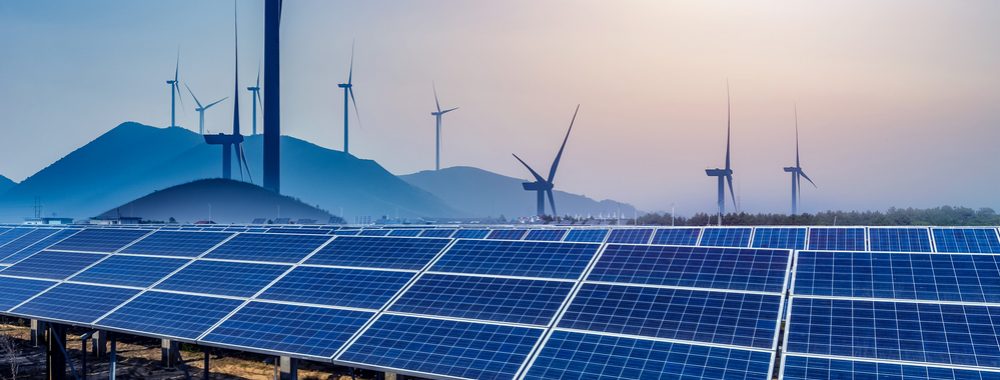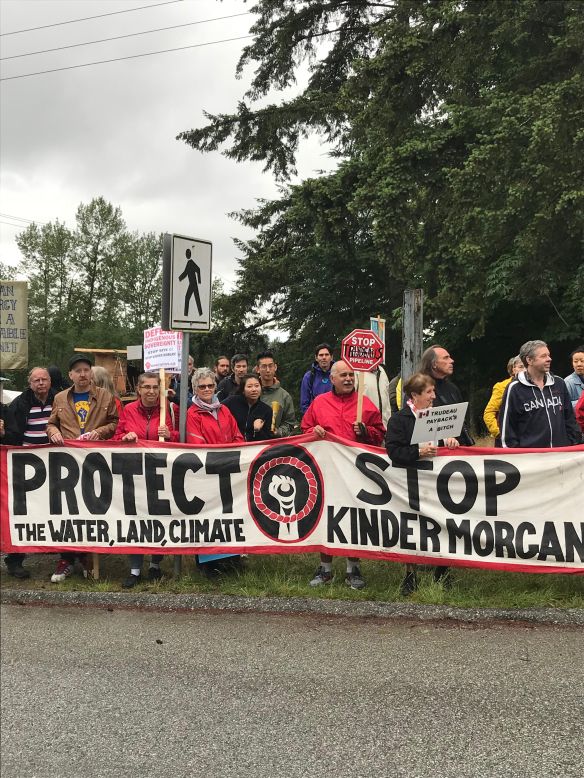
(Protest outside Kinder Morgan facility in Burnaby, BC. Photo by Calvin Beauchesne).
Project Overview
The Trans Mountain Expansion Project (TMEP) is a $7.4 billion project that would twin (or double) an existing pipeline (the Trans Mountain pipeline) from Edmonton area to Burnaby, BC. From there, the diluted bitumen (oil-soaked sand from the oil sands) would be loaded onto tankers and shipped for export to Asia. The expansion would increase the pipeline’s capacity from 300,000 barrels of oil a day to 890,000.
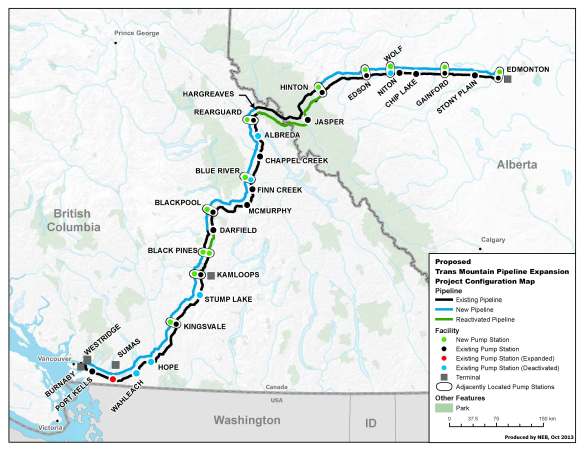
(Map of proposed pipeline expansion)
1- The pipeline undermines Canada’s efforts on tackling climate change
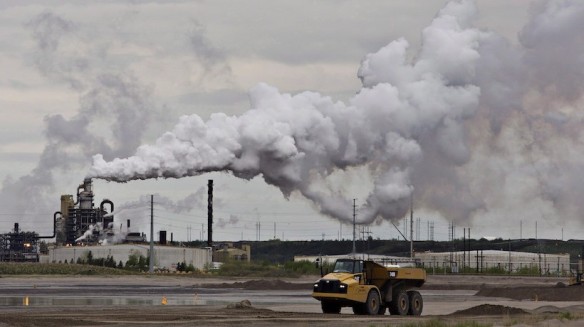
(Oil sands facility in northern Alberta)
Canada has set a target of reducing its carbon emissions by 30% from 2005 levels by 2030 as outlined in the Paris Agreement on Climate Change. As it is, we are not on track to meeting these targets with current policies. The carbon tax, the phasing out of coal-fired power plants and the low carbon fuel standard will not reduce our emissions enough to meet the targets we agreed upon in the Paris Agreement. So what’s holding us back?
The biggest culprit is the oil and gas sector, which represents Canada’s largest share of emissions. Emissions from the oil and gas sector have been steadily rising since 1990, while other sectors (with the exception of the transportation sector) have managed to reduce their emissions or keep them relatively stable.
The Trans Mountain pipeline will allow for further expansion of the Alberta tar sands, which are currently the fastest growing source of greenhouse gas emissions in the country. If completed, the pipeline would make Canada’s chances of hitting our emissions reduction targets under the Paris Agreement from ‘unlikely’ to ‘impossible’. If the pipeline is not built, this will inhibit further expansion of the industry, thus capping its emissions and giving us a fighting chance of meeting our targets.
It’s important we measure the carbon footprint of the pipeline internationally as well, not just domestically. Being an export pipeline, the pipeline will inevitably raise emissions in other countries using our oil that otherwise would not have had the product available to them.
While the pipeline would stimulate economic growth in the country, climate change is already costing Canada around $1 billion annually- from forest fires, to floods and other extreme weather events. This should be taken into account when measuring the economic benefits of the project.
2- The pipeline undermines Canada’s efforts for reconciliation with First Nations
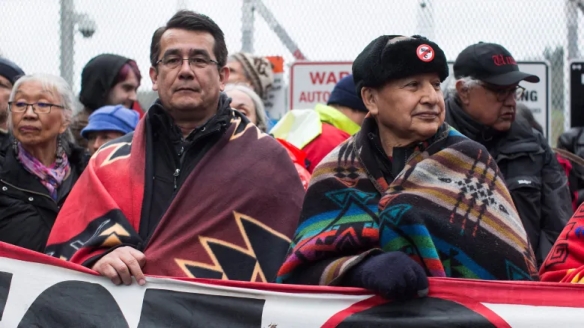
(President and Vice-President of the Union of BC Indian Chiefs Stewart Philip and Bob Chamberlain attend protest outside Kinder Morgan facility)
Justin Trudeau has tried to makes steps towards healing Canada’s relationship with Indigenous peoples since his government took power. The pipeline however will further escalate tensions between the Crown and First Nations.
Canada is a signatory to the United Nations Declaration on the Rights of Indigenous Peoples (UNDRIP). Outlined in this document is the need for “free, prior and informed consent” for any major development project by the Crown on Native lands. The Trans Mountain pipeline does not have consent from several First Nations along the route.
This issue is made more significant due to the fact that the pipeline route and almost all of British Columbia is unceded Indigenous territory- meaning it was never given over to the Crown in the form a treaty. Thus, the land was technically stolen from the Natives. Given this fact they should rightfully have a say over what happens on their lands.
Canada has had violent confrontations between Indigenous peoples and RCMP in the past, as we saw at Oka and Elsipogtog. The pipeline could trigger another one of these events, something that would not look good for a Prime Minister who is serious about ‘reconciliation’.
3- The pipeline could mean the extinction of southern resident killer whales
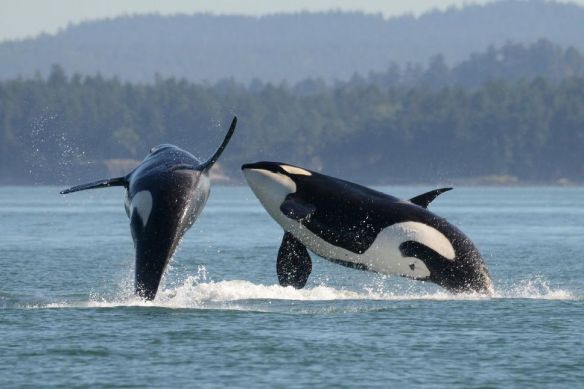
(Killer whales in the Salish Sea)
Southern resident killer whales (SRKW) are a specific community of killer whales in the Salish Sea that feed mostly on fish such as salmon. SRKW are a critically endangered species, with only 75 mammals remaining in the wild. Amongst their threats include a decline in salmon stocks, collisions with boats and noise pollution from shipping traffic, which makes it hard for these whales to communicate and hunt for prey effectively.
The Trans Mountain pipeline could result in a 700% increase in oil tanker traffic in the Salish Sea, from 5 tankers per month to 34. This increase in tanker traffic could have devastating consequences for SRKW. A report published by environmental group Raincoast Conservation found that the increase in noise pollution from increased tanker traffic from the pipeline expansion would substantially raise the likelihood of extinction for SRKW.
There is also the increased chance of an oil spill in the Salish Sea from such a large increase in tanker traffic, which would also have devastating consequences for SRKW. Especially when you take into account the type of oil the tankers are carrying (diluted bitumen) is much harder to clean up than conventional oil, due to the fact that it sinks.
The decline or extinction of SRKW will affect people as well. Killer whales are an iconic species in British Columbia. If we lose them, we lose our culture and identity at the same time. Lots of whale watching companies on Vancouver Island, the Gulf Islands and the Lower Mainland are dependant on these mammals for their businesses to survive as well. If we lose SRKW, it would be a big hit to the tourism industry in BC.
4- The pipeline is a threat to BC’s wild salmon populations

(Sockeye salmon in Fraser River, BC)
The Trans Mountain pipeline expansion would cross over 1000 streams and rivers in BC and Alberta, most notably the Fraser River and its watershed, one of the largest salmon tributaries in the world.
A spill could have devastating consequences for wild salmon, once again magnified by the fact that this is diluted bitumen we are talking about here, which is harder to clean up than conventional oil.
If you are doubtful whether a spill would happen one needs to just look to the track record of the existing Trans Mountain pipeline; the pipeline has had 82 reported spills since 1961, according to the company’s own website. It’s not if a spill will happen, but when.
Another report published by Raincoast Conservation highlights the risks of an oil spill to wild salmon in the Fraser River watershed. The report showed that salmon, especially juvenile salmon species, are extremely vulnerable to oil spills, and that the company did not take into account the possibility of sunken/submerged oil in their oil spill response plans. All this when 1/3 of salmon species in the Fraser River are already considered at risk of extinction.
Like SRKW, wild salmon are also an important cultural species to people in BC, especially First Nations. If salmon stocks plunge, both the recreational and commercial fishery industries in the province will take a hit accordingly.
5- The pipeline undermines Canada’s transition to a renewable energy future
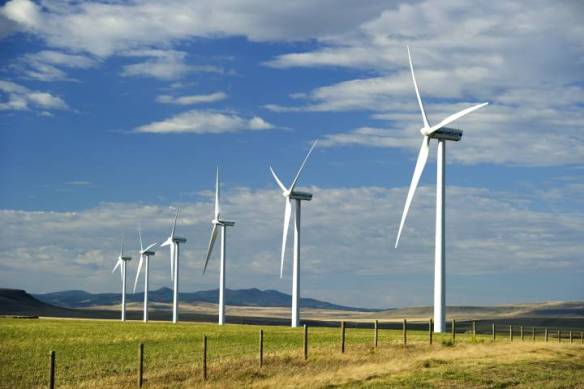
(Wind farm in Alberta)
Proponents of the pipeline often cite jobs and economic growth for their support of the project. What if I told you we could create jobs, grow the economy and reduce our carbon emissions WITHOUT building the pipeline?
Think about it. The project is estimated to cost $7.4 billion (or more when you factor in things like the federal government’s Oceans Protection Plan, a $1.5 billion dollar program designed specifically to improve oil spill response plans and buy public support for the pipeline). That money could go a long way if we invested it in renewable energy instead (that’s a lot of solar panels and wind turbines!).
A report published by Blue Green Canada, an alliance between Canadian labour unions, environmental and civil society organizations, showed that investing $1 million in renewable energy creates 15 jobs, compared to 2 in the oil and gas industry for the same amount of investment. Renewable energy could be a great replacement for those who are losing their jobs in the struggling oil patch in Alberta.
Canada could choose to be a leader in renewable energy, or we could remain attached to a dying 20th century industry and build another pipeline. While countries like Norway, Germany and France lead the way on renewable energy investment and technology, Canada is being left behind in the dust.
Bob Dylan had it right in the 1960’s:
“The answer my friends, is blowin’ in the wind. The answer is blowin’ in the wind.” – Bob Dylan
